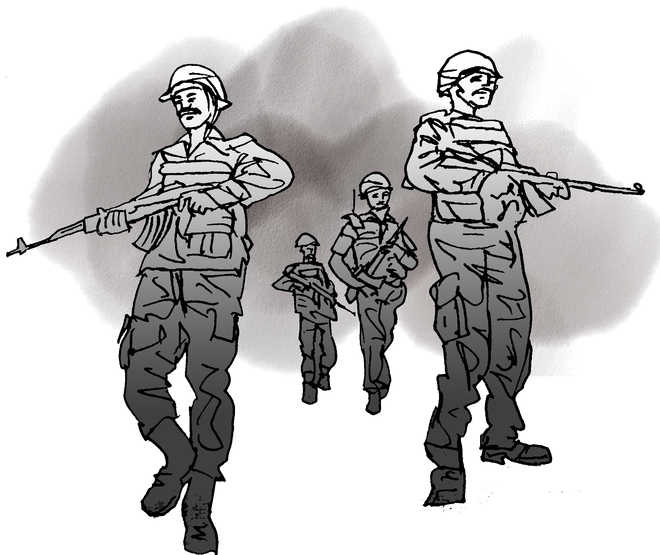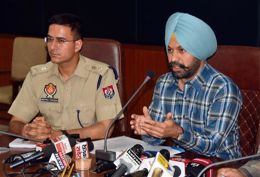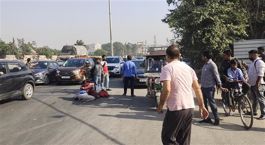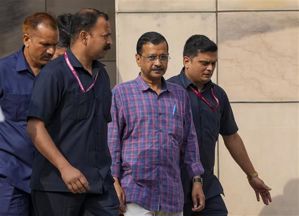
Illustration: Sandeep Joshi
Brig Vivek Lall
The notion of victory or military success, be it in war or counterterrorist operations, lies in the mind. We know it better now, because of the pervasiveness of social media and the ease in availability of information. For me, this lesson was driven home in the forests of Jammu and Kashmir on the LoC at a time when terrorism was at its peak in the early 1990s.
My battalion had just moved to the LoC in an area known to be a traditional infiltration route. Our warm welcome started with discovery of an improvised explosive device along the fence where we kept our ammunition. If that was not enough, we found solar-activated rockets apparently aimed at where some of the officers stayed. We were fortunate in preventing what could have been a very sticky beginning. In the period that followed, we did everything we could to 'dominate' the LoC and the entire area behind it, where there were about 20-odd villages spread over approximately 80-100 sq km. In the rear areas, our innovative patrols would climb mountains from one side and walk through villages on the other to completely surprise even the locals; and we cultivated a network to identify 'over ground workers' or terrorists operating in full view. One such person (a shopkeeper) had faced multiple arrests and interrogations by different agencies. In absence of evidence, he was always released.
Knowing that he would never volunteer information, we designed a simple yet innovative plan. I started calling him every morning to our headquarters, where he would be made to sit comfortably in full view of everyone moving around, including the porters. Each day we would ask him about his terrorist links, and each day he would deny it. After a couple of hours, we would send him back to his village, which was a 30-minute walk away. While returning, he would often stop for tea at a shop before starting his journey along a single road connecting to the highway. This road was mostly deserted with a few villages located at intervals. The routine continued without a break for almost a month. One such day, just before leaving him I sent some vehicles ahead. They parked along a lonely patch, pretending that one of the vehicles had broken down. Our suspect, as usual, stopped to have tea before starting his journey, all alone. When he came up to the vehicles, he was very quietly bundled into them and taken to our base, completely under cover and hidden.
By evening, village elders were seeking our support to find him. They appeared to accept that he probably had links with terrorists and run away to avoid being caught. Around midnight, our vehicles came up and in complete darkness brought our suspect to me.
Our psychological domination over this terrorist was complete. Realising his predicament, he gave away every bit of information he had. He then took our patrol to the forest near his village and showed where he had hidden his supply of weapons and ammunition. I ensured that the patrol returned through his village first thing in the morning with him in tow, and the captured weapons in full view of the villagers. For us, the biggest revelation was the first anti-personnel non-detectable mine in the cache he handed over. Had he used the mines; this could have been a different story. It took us 24 hours to pack him off into jail, but interestingly, he was out in just a few months. This time though, his demeanour had changed. There was no defiance left in his eyes, or any fear either -- just acceptance.
The lesson for me lay more in how he was captured and what happened thereafter. We did not just dominate this terrorist's mind space completely, but even of the villagers. One of the elders came up to me and said "sahab, aapka pir to hamare pir se bahut bara hai" (the saint that looks over you is bigger than ours).There were absolutely no incidents of terrorist activity in our rear areas thereafter. I don't think that it was fear of the Army that did the trick. It was more akin to respect and recognition. And this was not just because of our patrols, but also because of our genuine efforts to support development in the area, including our Santa Claus like Commanding Officer who would go around distributing toffees to children each time he stepped out.
This was just one block in the district of Baramulla where our efforts found resonance. But it holds lessons for the entire state, that to counter terrorism and radicalisation, it is the mind-space that has to be dominated. Respect for state institutions can't be achieved by force, nor can it be done by seeking popularity and going easy on offenders, and it certainly can't be done by throwing development money. There are probably no fixed answers, just a muddled way ahead.



























